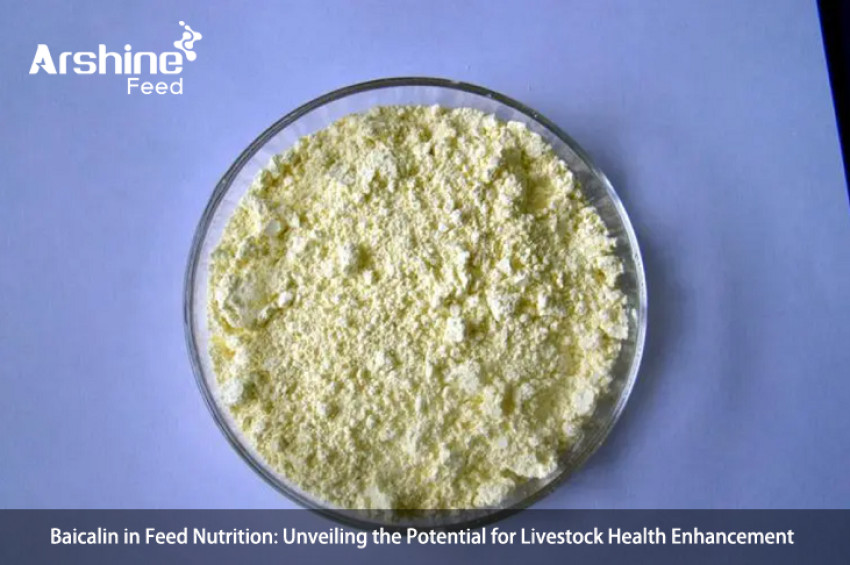
Introduction
Baicalin, a natural flavonoid derived from the roots of Scutellaria baicalensis, has a long history of use in traditional medicine due to its antioxidant, anti-inflammatory, and immunomodulatory properties. In recent years, the exploration of baicalin's potential in animal feed nutrition has gained momentum. This article delves into the multifaceted applications of baicalin in livestock feed, its mechanisms of action, potential benefits, and the considerations that come with its integration into modern livestock management practices.
What is the action of baicalin?
Baicalin's therapeutic effects are attributed to its intricate interactions with various cellular pathways. As an antioxidant, it scavenges harmful free radicals, mitigating oxidative stress that can impair animal health. Its anti-inflammatory properties help modulate immune responses, potentially reducing the impact of inflammatory conditions. Moreover, baicalin's ability to influence gut microbiota may lead to improved gut health and nutrient absorption. These mechanisms collectively contribute to its potential benefits in livestock feed nutrition.
Feed Nutrition Enhancement
The incorporation of baicalin into animal feed aims to harness its bioactive properties to enhance livestock health, growth, and performance. Its potential to influence various physiological processes opens up opportunities to optimize nutrient utilization, bolster immunity, and support overall animal well-being. By promoting a balanced microbial environment in the gut, baicalin may enhance nutrient absorption and contribute to improved feed conversion rates.
Proposed Benefits
Antioxidant Support: Baicalin's antioxidative effects can help mitigate the negative impact of oxidative stress on animal health. This is particularly relevant in the context of livestock production, where stressors such as environmental conditions and management practices can challenge animals' antioxidant defense systems.
Anti-Inflammatory Effects: Inflammation is a common response to stress and disease. Baicalin's anti-inflammatory properties may help dampen excessive inflammatory reactions, maintaining a healthier immune balance and reducing the risk of chronic health issues.
Gut Health Enhancement: Baicalin's potential to influence gut microbiota composition could have far-reaching effects on nutrient absorption, immune function, and overall gut health. A balanced microbial community contributes to improved digestion and absorption of nutrients.
Immune Modulation: Baicalin's immunomodulatory properties could potentially prime the immune system for more effective responses to infections, leading to decreased susceptibility to diseases and reduced reliance on antibiotics.
Considerations and Challenges
As with any novel approach to livestock nutrition, integrating baicalin into animal feed comes with certain considerations and challenges:
Dosing and Bioavailability: Determining the optimal dosage of baicalin for different livestock species and production stages is essential to achieve desired effects without risking toxicity. Additionally, ensuring its bioavailability and stability in feed formulations is crucial.
Safety and Regulatory Approval: Before baicalin can be widely used in animal feed, thorough safety assessments and regulatory approvals are required to ensure its efficacy and safety for livestock consumption.
Interaction with Other Feed Components: Baicalin's interactions with other feed ingredients need to be thoroughly studied to avoid potential negative effects on nutrient availability or animal health.
Economic Viability: The cost of producing baicalin-enriched feed and potential benefits in terms of improved livestock health and production must be carefully evaluated.
Commentary and Future Prospects
The exploration of baicalin's potential in feed nutrition marks a promising frontier in livestock management. The multifaceted benefits it offers, from antioxidative support to immune modulation and gut health enhancement, could contribute to more efficient and sustainable livestock production practices. However, careful consideration of dosing, safety, and economic viability is essential before wide-scale adoption.
Collaborative efforts between researchers, veterinarians, and agricultural experts are crucial to unlock the full potential of baicalin in livestock nutrition. Rigorous scientific studies encompassing different livestock species, production conditions, and stages of development are needed to validate its efficacy. Ethical discussions about the potential benefits and drawbacks of integrating natural compounds like baicalin into animal feed should guide decision-making processes.
In conclusion, baicalin's integration into livestock feed nutrition presents an exciting opportunity to enhance animal health and production outcomes. Through systematic research, thoughtful consideration, and collaboration, this natural compound could play a significant role in shaping the future of sustainable and health-conscious livestock management practices.
https://www.arshinefeed.com/Knowledge/baicalin-in-feed-nutrition-unveiling-the-potential-for-livestock-health-enhancement



